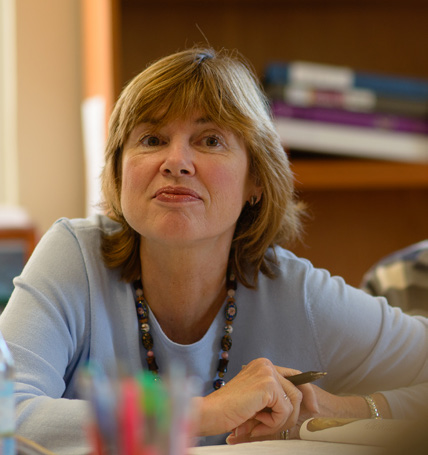
Laurel Starks
History and Social Sciences Department
Member of the Faculty 1986–2019

Laurel’s warm presence has been felt in every corner of our community since she arrived on campus in 1986. As her department chair noted in her first year of teaching, Laurel was “the perfect example of a young teacher who should be encouraged to become more involved with the life of our School.” She did, and turned out to be a perfect fit for us. It did not take long for Laurel to find her way around our grades 7–12 history and social sciences department. For many years, she taught ancient and medieval history, economics to senior boys—not an easy task, by the way—and led our work in Class IV. When we formed our Middle School, Laurel helped guide our K–8 program through its transition and then was instrumental in the creation of Ancient Civilizations and Modern World History IV.
Laurel has always been at the forefront of new initiatives—she developed interdisciplinary projects with our eighth-grade English teachers and created a World Cultures course that made social studies more meaningful for our Middle School students. In 2004, Laurel was recognized for her work in curriculum development by Primary Source, a national organization that works to advance global and cultural learning in schools, when her lesson plan was published in its sourcebook, Making Freedom: African Americans in U.S. History.
Perhaps her most profound impact on our department has been as a mentor. For more than 15 years, Laurel has supported a new generation of teachers as they honed their craft. Good mentors, ones that can inspire, guide, and promote growth, are rare, and Laurel is one of the best. She has never forgotten what it means to be a new teacher at Milton, and she has worked tirelessly to help others find their bearings and create a life here.
In 1993, Laurel and her young family moved into Forbes House, where she served as dorm head until 2003 and earned high praise year after year. One charge remembers, “Mrs. Starks goes completely out of her way to satisfy even the smallest needs of students. Very like a mom. Always there for us.” As a former dean of students observed, Laurel “seems to have found the magical balance of being strict enough that the student feels the boundaries around them, flexible enough to know that they are not just parts of a machine, and dedicated enough to have students realize that when the chips are down, somebody will take good care of them.” Laurel never really left the boarding community, even when she moved out, because she continued to do dorm duty and advise boarding and day students.
Laurel has helped so many of us find our Milton family. Before my son was born, she helped me find my way to Academy Day Care, something I hadn’t even thought of yet. She arranged playdates for our children so that I could meet more Milton families, and even when she was swamped with her own work, she always knew when to check on me after a long day. As Andrea Geyling-Moore says, “Laurel has always juggled gracefully and with good humor the challenge of wearing many hats. I have seen firsthand through our many years as colleagues and friends how she was the consummate dorm head, advisor, teacher, committee member, mentor, and at the same time, a wife and mother of two amazing children. While my own child-rearing phase followed 10 years after hers, at just the right moments, she shared sage advice that was spot-on in its practicality and compassion, and for that I am forever grateful.”
Laurel’s colleagues have come to depend on her, and she will be missed deeply. It is difficult for us to say good-bye to one of our best friends. Even so, we wish Laurel and Keith all the best as they enjoy their years of retirement together, traveling the globe and visiting with friends and family.
Vivian WuWong
History and Social Sciences Department




